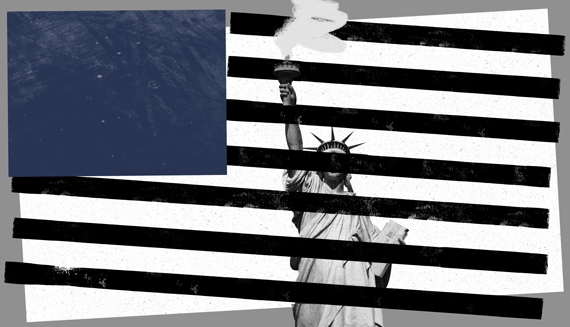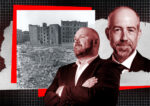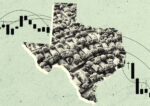Trending
Farewell, safe-haven status
New York real estate has long appealed to investors seeking stability. So, what to make of a president who embodies disruption?

New York City brokers might need to start taking courses on the psychology of fear. As President Donald Trump’s push to bar immigrants from seven Muslim-majority countries remains in limbo, the city’s real estate industry is grappling with increased apprehension from potential foreign buyers.
The so-called travel ban on citizens from Iran, Iraq, Syria, Somalia, Libya, Sudan and Yemen, first announced on Jan. 27 and quickly suspended by a federal court ruling, has put many around the world on high alert.
While none of those seven countries are major players in NYC real estate, the push — largely shaped by Trump’s chief strategist Steve Bannon — has rankled buyers from other regions that are. Even if the executive order remains blocked by federal judges, it creates a lingering anxiety among overseas investors, sources say. Now, multiple brokers believe that uneasiness could rattle the city’s long-held status as a haven for foreign capital.
Sebastian Fischer, a managing director at Engel & Völkers based in Berlin, said a handful of wealthy buyers from the Middle East and Asia who would have previously invested in New York are starting to look at Germany’s capital instead. One main reason, he told The Real Deal, is concern over Trump’s “America First” policy.
“The mood is certainly not optimal,” Fischer said about foreign buyers’ views of the U.S. in 2017. Investors from the Middle East and Asia, “often look at Berlin as the first alternative,” he added.
It’s not the first time that the European city has felt the aftershocks of a thunderous step taken in the White House. In the early 2000s, for instance, a wave of young Americans moved to the German capital in search of a government more to their liking after George W. Bush launched the country’s invasion of Iraq.
While it’s early days yet under president Trump, the latest views from Germany — and other parts of Europe — do little to soothe a concern that is spreading throughout New York’s real estate industry.
“The turbulent last few weeks in the U.S. have undoubtedly had an extremely disquieting effect on foreign buyers,” Alexander Kraft, the CEO of Sotheby’s International Realty France, explained.
“The travel ban, the unraveling of decades-old international alliances and hard-fought global initiatives, as well as the blunt protectionism, raise a lot of red flags,” said Kraft, who’s based in the sovereign city-state Monaco on the border of France.
It is too soon for any data that could show notable shifts in overseas investment in NYC, or lack thereof, in connection to Trump’s immigration orders. And most of the people interviewed for this story said they still see strong interest in New York real estate from abroad. But those sources also noted that many foreign buyers are taking a more cautious approach, and that some are holding off on potential deals to monitor the next wave of changes in America’s political climate.
At the same time, overseas capital has significantly dwindled as the city’s real estate market has come to the end of a robust cycle. Between November and January, foreign investors accounted for $4.64 billion in NYC real estate acquisitions, down from $17.32 billion in the same period a year earlier and $7.7 billion two years prior, data from Real Capital Analytics shows.
 Some brokers in New York fear that if the current political turmoil in and around the White House continues — and if protectionism and xenophobia gain further ground — foreign investment could suffer long-term damage.
Some brokers in New York fear that if the current political turmoil in and around the White House continues — and if protectionism and xenophobia gain further ground — foreign investment could suffer long-term damage.
“The worry is what’s going to come next,” said Jason Haber of Manhattan-based Warburg Realty in an interview in mid-February. “Today the travel ban is on seven nations, but what happens if there’s an attack in our country?”
Savills Studley executive managing director Woody Heller noted that some foreign investors are bracing for more uncertainty, given Trump’s initial and updated travel ban orders.
Plans for a 2,000-mile wall separating the U.S. from Central and South America and potential trade disputes only add to the concern, sources say. Wealthy Chinese investors — who often buy Manhattan apartments so that their children can live in them — are among those showing signs of ambivalence, Sotheby’s International broker Nikki Field told TRD.
“Many are rethinking their long-held plans of sending their children to U.S. schools, nervous that it may not be a secure commitment to emigrate [here],” she said. “Local brokers and wealth advisors have taken to recently counseling some of our clients to adjust their goals to Australia or Canada.”
Latin American buyers are less spooked by Trump’s political agendas, argued Marcos Cohen, a Douglas Elliman broker who regularly represents clients from South America.
“They’re more concerned about what’s going on in their countries than what’s going on here,” he noted, referencing political and economic upheaval in Brazil and Venezuela. While Trump’s actions “have certainly opened their eyes a bit” and are a conversation topic, they haven’t led buyers to abandon investment decisions, Cohen said.
Mexican buyers — though they typically play a smaller role in NYC’s real estate market — may be a different story, he speculated. The most expensive for-sale listing at Trump Tower on Fifth Avenue happens to be an apartment owned by Elias Sacal, a Mexican real estate heir. Sacal listed the apartment for sale in March 2016, 15 months after buying two units and combining them into one. Sacal’s listing broker declined to comment.
The allure of stability
In many cases, a desire for safety and security has drawn wealthy foreigners to the city’s luxury residential market in the first place. In recent years, as Europe staggered from one financial crisis to another, South America grappled with political turmoil, and China flirted with a market crash, the Big Apple seemed like the best option to a growing number of buyers.
“New York real estate is the new Swiss bank account,” a 2014 article in New York magazine boasted.
Then came the Trump administration, which has contended with record-low approval ratings, widespread protests and ongoing media scrutiny, as well as resignations, leaks and lawsuits — all within five weeks of taking office.
“Wealthy investors love one thing,” Leonard Steinberg, president of the residential brokerage Compass, told TRD. “They love certainty.”

Berlin could see an uptick in real estate investment due to Trump’s proposed travel ban.
Of course, Trump and his inner circle haven’t turned the boroughs into a hazardous investment. New York remains the biggest city in the country and one of the driving forces in the global economy, while its apartment prices are still widely regarded as less prone to crashing. And some foreigners see Trump — a former developer who has vowed to slash taxes and regulations — as a potential boon to the city’s real estate market. Likewise, his son-in-law and senior adviser, Jared Kushner, is a former real estate executive with direct ties to foreign investors and a family empire with a U.S. portfolio worth almost $6 billion, according to RCA data.
Elliman broker Jacky Teplitzky said Trump’s plan to loosen financial regulations would be like opening “a faucet that has been closed for a long time.”
“Yes, people are not happy about it,” she noted, “but they also understand that he is a businessman.”
Michael Seiler, a finance professor at the College of William & Mary in Williamsburg, Virginia, who studies behavioral economics in real estate, said that faith in the strength of U.S. democratic institutions will likely reassure foreigners looking to invest for the long term.
“Trump won’t be president for 25 years. I still view it as a blip in the road,” Seiler said. “I don’t see another leader following a policy like that.”
Yet while foreign interest in NYC has by no means iced over, it could further cool for less political reasons. Among them: foreign exchange rates, Fischer of Engel & Völkers noted. Trump’s vows to boost federal spending and cut corporate and income taxes has raised economic growth expectations and caused the U.S. dollar’s value to rise against other currencies, including the euro. That makes apartments and homes in European countries a cheaper investment.
Uncertainty over the eurozone and Britain’s future, however, makes New York look stable by comparison, said Joel Moser, head of the infrastructure and real estate fund manager Aquamarine Investment Partners. “The U.S. under Donald Trump benefits from the fact that the rest of the world is in flames,” he argued.
Compounded fears
Nevertheless, political turmoil at home does little to help a market that is already slowing amid fears of a cyclical downturn and rising interest rates.
“Obviously, you don’t want any sort of uncertainty coupled with the fact that we’re in a very weird time in the market,” said Aaron Appel, a senior mortgage broker at JLL in New York.
Some investors, primarily from Muslim countries, are “worried their assets will be seized” in the wake of the travel ban, Heller argued.
Even those who don’t fear seizures may have good reason not to invest so long as uncertainty prevails. One New York broker said he recently met with German investors who told him they are holding off on investments in the U.S. for six months to see how things turn out with Trump.
Meanwhile, some foreign buyers who are interested in purchasing New York real estate could face tougher restrictions if Trump follows through on his vow to go after countries like Iran.
The Treasury Department’s Office of Foreign Asset Control (OFAC) has the authority to block foreign funds or freeze foreign assets in the U.S. in any case where the president declares a national emergency and states that an entity poses an extreme and unusual threat. If the federal government identifies a company as supporting terrorists, for instance, the OFAC’s sanctions programs can freeze it out of the U.S. financial system.
While Trump launched new sanctions against Iranian entities involved in ballistic missile sales, the decision was consistent with the Obama administration’s intentions, said Oliver Krischik, a sanctions lawyer with Price Benowitz based in Washington, D.C.
“It didn’t come as any surprise to us,” Krischik told TRD. “Under the new administration, it may be very likely that the White House will want stronger enforcement actions for potential sanctions violations.”
Civil penalties for sanctions violations can be as high as $300,000 per transaction and do not require proof of criminal intent. The risk of incurring penalties is a major concern for Krischik’s corporate clients, who could be slammed with substantial fines, the attorney noted. Americans who sell real estate to foreigners tied to terrorists are also subject to penalties.
Of course, no one knows what the next few months — let alone the next four years — will bring. But the deepest fear in the NYC real estate industry is that the coun- try’s political situation reaches the point of genuine crisis. That could bring down property values citywide on a long-term basis, according to several sources, though most consider that an unlikely outcome.
“What happens if the streets of New York City are lined with social unrest?” Steinberg of Compass said. “That’s not going to be good for real estate.”
—Gabrielle Paluch contributed reporting




